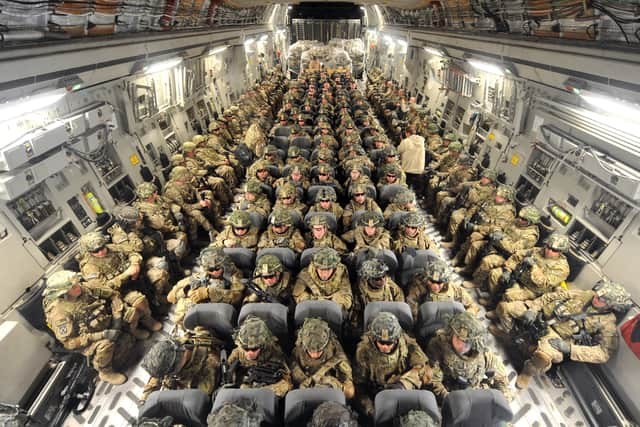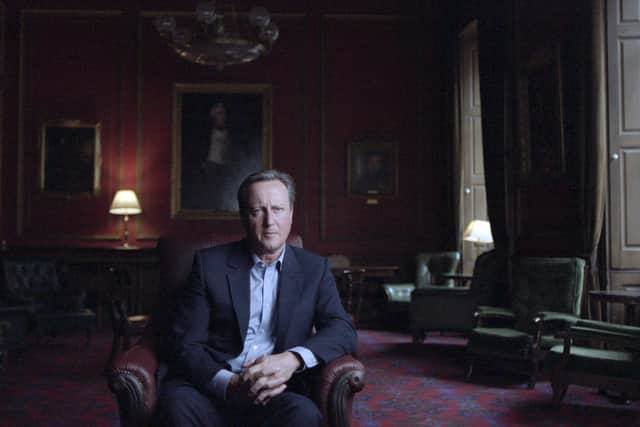Afghanistan: Getting Out: release date of BBC documentary on withdrawal from Afghanistan and fall of Kabul
and live on Freeview channel 276
On 15 August 2021 the Taliban captured Afghanistan’s capital city Kabul just weeks after launching an insurgency.
A new BBC documentary sheds light on the planned withdrawal of Amiercan troops, which had been a presence in Afghanistan for 20 years, and the rapid collapse of the middle eastern republic.
Advertisement
Hide AdAdvertisement
Hide Ad

In the year since the Taliban has taken over the country, the group has enforced religious fundamentalism and severly curtailed women’s rights, recently ordering women to cover their face in public.
Afghanistan: Getting Out features those who were most closely involved in the withdrawal as they reveal why it happened as it did.
What is Afghanistan: Getting Out about?
The two-part documentary condenses a conflict that ran through four presidencies over two decades into two hours.
Getting Out revisits the reasons for the war in Afghanistan, originally launched with the aim of capturing Osama Bin Laden, the mastermind of the 9/11 attacks.
Advertisement
Hide AdAdvertisement
Hide AdThe documentary then explores how US involvement in Afghanistan overstepped its brief, becoming a bloody conflict that led to the deaths of almost as many Afghani civilians and opposition fighters - 46,000 compared to 53,000.
The first episode explores how President Barack Obama attempted to get troops out of the country during his two terms, and how he came up against heavy opposition from his generals who wanted more boots on the ground.
It explores how Obama and then Vice President Joe Biden butted heads over Obama’s capitulation to the generals as more troops were sent into the breach.
The second part of the documentary follows Donald Trump’s campaign to bring the troops home and the beginning of negotiations with the Taliban.
Advertisement
Hide AdAdvertisement
Hide Ad

The government of the Republic of Afghanistan is sidelined and the US deals directly with the fundamentalist group instead, eventually agreeing to a unilateral withdrawal.
The episode then follows onto Joe Biden’s presidency and his controversial decision to stand by Trump’s deal as he sets a date for the withdrawal.
Much of the second episode is focused on 15 August, the day that Kabul fell to the Taliban - Ashraf Ghani, the President of Afghanistan is evacuated and the Taliban enter the capital.
As the capital is taken by the Taliban, thousands of desperate Afghans, some of whom worked with the US government, crowd airports as they try to flee the country.
Advertisement
Hide AdAdvertisement
Hide AdWho is featured on Afghanistan: Getting Out?
The documentary features contributions from those involved directly in the war effort and the withdrawal plans. There include:
- General David Petraeus
- General Douglas Lute
- Secretary of Defense Robert Gates
- General Sir Nick Carter
- Former British Prime Minister David Cameron
- John Kelly, Trump’s Chief of Staff
- John Bolton, former national security advisor
- Lisa Curtis, Senior Advisor on the National Security Council
- Ross Wilson, Acting US Ambassador to Afghanistan
- Hamdullah Mohib, former Ambassador of the United States to Afghanistan
- Suhail Shaheen, Permanent Representative of Afghanistan to the United Nations
- Matin Bek, Ghani’s Chief of Staff
When is Afghanistan: Getting Out on TV?
The first episode of Afghanistan: Getting Out first aired on BBC Two on 14 August. The second part of the documentary will air on BBC Two at 9pm.
Both episodes are already available to watch now on BBC iPlayer.
Comment Guidelines
National World encourages reader discussion on our stories. User feedback, insights and back-and-forth exchanges add a rich layer of context to reporting. Please review our Community Guidelines before commenting.
